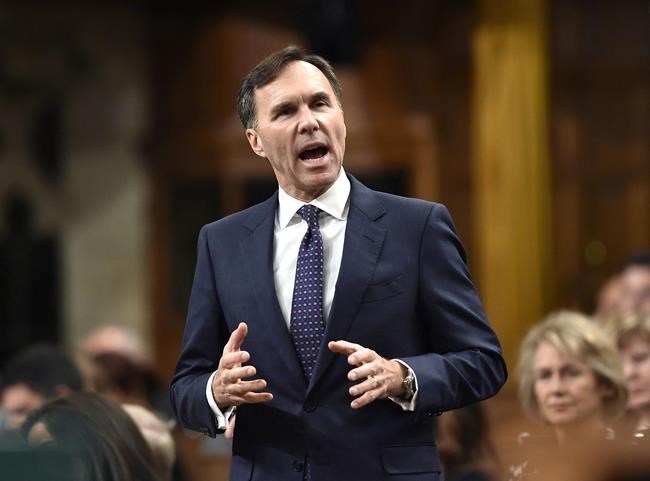
Minister of Finance Bill Morneau rises during Question Period in the House of Commons on Parliament Hill, in Ottawa on Thursday, Oct. 26, 2017.
Image Credit: THE CANADIAN PRESS/Justin Tang
October 29, 2017 - 6:00 AM
OTTAWA - Political cynics had plenty of fodder this week, with the curious timing of multibillion-dollar spending announcements and morphing Liberal views on veils.
Parliament Hill was completely caught up in the twists and turns of Finance Minister Bill Morneau's ethics saga, with many a politico calculating on the back of a napkin how many billions of dollars the government would spend in new announcements to try to make the scandal go away.
But while the Liberals took repeated body blows on Morneau, they also gloated over Monday's upset byelection win deep in traditional separatist territory in Quebec, taking the seat away from the Conservatives and trouncing the NDP.
At the same time, more than one political skeptic noted that the Liberals' rhetoric on what to do about Quebec's new ban on face coverings when interacting with public services changed noticeably after the byelection victory.
Before: it's a provincial responsibility. After: Ottawa is examining ways to challenge the law for its constitutionality.
Cynicism aside, there were material and revealing developments from the mini-budget, from the latest tranche of the census and from the National Energy Board. Here's how politics touched Canadians this week:
OF KIDS AND CRISIS
The original plan back in the lazy days of summer was for Morneau to use the annual fall economic statement to roll out a triumphant version of the proposed tax reforms to close loopholes for the rich.
Instead, beset by controversy around the loopholes and compounding accusations of conflict of interest, the finance minister unleashed $15 billion in new spending over five years.
Notably, most families with children will see their Canada child benefit cheque tied to the cost of living, starting next year. And people at the low end of the income spectrum will eventually see a boost to the working income tax benefit — an incentive designed to keep or attract low-wage workers in the workforce rather than stay at home and collect government benefits.
The policy goal is to permanently entrench and adequately finance a system of income support, and alleviate the anxiety of the working poor and almost-middle-class over the long term. The political goal is more immediate: to outshine the ethics scandal with government largesse.
OF GROWTH AND INDIGENOUS PEOPLES
Statistics Canada released another tranche of its 2016 census this week, and the growth of the Indigenous population was astounding. Almost 1.7 million people now identify as Aboriginal — an increase of 42.5 per cent from 2006, partly because of increased life expectancy and a high fertility rate, and partly because of a new willingness to identify as First Nations, Metis or Inuit.
For a government looking to rejuvenate an aging workforce, the potential is alluring. But the census also showed that Indigenous children under the age of four account for half of the number of kids in foster care — dramatically out of proportion to the size of their population and an alarming sign of poverty and neglect in some Indigenous communities.
Meanwhile, the federal government continues to butt heads with children's advocates about the appropriate level of funding for First Nations child welfare. This week, Indigenous Services Minister Jane Philpott pressured the provinces to get more involved.
This week's mini-budget did not contain any significant extra money for Indigenous children.
OF OUR FIXATION WITH FOSSIL FUELS
Canadians' demand for fossil fuels is about to peak, the National Energy Board projects in a new report. Demand for oil and gas will start to decline slightly after 2019 and then flatline for about two decades — even in a scenario where technology and a carbon price don't play a role.
A meaningful carbon price and new technology will make the turnaround even more dramatic, the NEB report said.
Canadians, the research shows, are replacing oil and gas with wind and solar energy, and electric vehicles are starting to catch on.
But at the same time, Canadian oil production will continue to grow, driven by exports, the report says.
News from © The Canadian Press, 2017